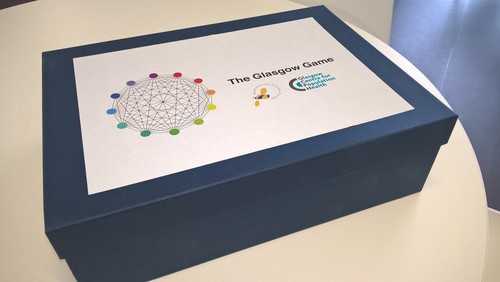
Playing the Glasgow Game
Through the game participants become familiar with health and wellbeing in Glasgow, start to think about the complexities and social context of the city and consider possible futures for the city. Participants work together and are encouraged to role-play, for example to be the city’s commissioner for health or transport or the environment and at the end of a game participants put forward their best ideas for how to create a better city.
Who can play and how?
Typically 20-30 participants are involved – but there can be fewer or more – and the game can be played in 2-3 hours over a morning or afternoon. It provides a structured way of investigating strategic questions, tapping into the life experience and knowledge of participants.
The game uses intelligence from Understanding Glasgow an online resource which uses data from many sources to describe health, life circumstances and inequality within the city. Very quickly participants become immersed in how different themes interact – population and poverty, health and environment, etc – and become aware that efforts to improve the city need to take account of impacts across the city across all its populations.
We have used the game with groups of planners, community groups, health professionals, students and school pupils, and if you would like a more in-depth feel for how the game is played have a look at Rachel Harris’ blog where she reflects on the experience of playing the game.
The Glasgow Game in a box
The Glasgow Game in a box is an offline ‘board game’ type version of the Glasgow Game. It was developed because it’s often easier to play the game offline and not rely on having an internet connection to access the online Understanding Glasgow resources.
Strategic questions addressed in the game
Since 2013, the game has been used to explore a range of strategic questions for the city: how can Glasgow address the key challenges around drugs and alcohol?; how can the food environment in the city be changed?; and, how might Glasgow become a better connected city? There is also a case study based on the IFF’s World Game where the challenge set was ‘Developing a Resilient Scotland’.
The food environment-focused game was played by third year pupils at Glasgow schools, and it was great to see pupils becoming engaged as advocates for change during the game.
It was helpful for the children to understand that where they're living in Glasgow poverty and deprivation can affect their health directly.
(School teacher commenting on session focused on changing the food environment)
In other games students have been set the ‘simple’ task of answering how they would reduce health and social inequalities in Glasgow! They may not have come up with all the answers but this exercise has certainly encouraged them to think holistically and to recognise complexity.
Players, facilitators and feedback
In my opinion, game sessions work best when a range of people from different backgrounds and perhaps with different opinions are involved. The skills of the game facilitator are important in order to ensure the game flows and that all participants get involved.
Often at the end of the game, people are enthused and want to see things happen and change. This is a good thing but expectations also need to be managed. There are no wrong and right answers in the game. This is an exercise in collective thinking and discussion. The proposals that come out of the game can be left as part of the game or can be written up and shared with others as a part of other processes.
The following testimonials illustrate the range of feedback we have received from people who have played the game.
The Glasgow Game provided us with a highly structured tool to initiate consultation across diverse groups. As some of the vernacular we were using in our consultation had multiple meanings and definitions, the Glasgow Game enabled us to introduce a definition which the participants could then explore through the multiple 'locuses' in the game and arrive at their own understanding.
(Laura Geoghegan, Project Officer, Glasgow City Council)
The organisation is going through a bit of a soul searching period before it makes this big change, and this really feels as though it has helped us to fill a bit of that void … it’s really worked for me.
(Gehan Macleod, Co-founder and Programme Director of Galgael)
Future games?
The Glasgow Game could, I think, be used constructively to better understand and debate lots of different challenges. Listening recently to (another!) BBC Radio Scotland debate on the state of Scottish football I found myself wondering whether the Glasgow Game could be used to explore this issue – how can we encourage and support more young women to play football? Is there equality of access in participation in youth football?
Many sports will face these same issues, so alternatively, perhaps a future game session could focus on how we increase access to sport in general or how we encourage greater physical activity among children. The Active Healthy Kids Scotland Report Card 2016 card illustrates the huge gap between our aspirations to raise children’s physical activity levels and the reality.
We'd like to hear from you
In future we hope many new and diverse issues will be discussed and debated through the lens of the Glasgow Game and we are keen to encourage use of Understanding Glasgow and the game. So we are interested in hearing from organisations who would like to play the game and perhaps have a specific issue that they would like to explore. There is a limited number of copies of the Glasgow Game in a box available on request.
If you have any ideas for future topics that can be explored using the game we’d love to hear them so please email us if you would like to play the game, find out more about it or would like to request a copy of the game.